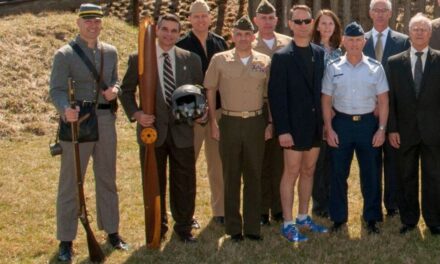Once upon a time, in reference to America’s invasion of the Philipines in the late 19th Century, Rudyard Kipling wrote an infamous poem pleading for us to take up the White Man’s Burden in rarefied tones dripping with paternalism, hypocrisy and racial prejudice.
Today, we have our own version of Kipling in noted writer Shelby Steele, in this essay in which he bemoans our nation’s “White Guilt” and asks us to transcend it in order to bomb the crap out of 21st Century wogs.
White Guilt? you ask. Is he serious? Unfortunately, the answer to that question is a resounding “Yes.”
Follow me below the fold to read the man’s argument for yourself . . .
There is something rather odd in the way America has come to fight its wars since World War II.
For one thing, it is now unimaginable that we would use anything approaching the full measure of our military power (the nuclear option aside) in the wars we fight.
[…]
Why this new minimalism in war?
It began, I believe, in a late-20th-century event that transformed the world more profoundly than the collapse of communism: the world-wide collapse of white supremacy as a source of moral authority, political legitimacy and even sovereignty. . . .Today, the white West–like Germany after the Nazi defeat–lives in a kind of secular penitence in which the slightest echo of past sins brings down withering condemnation. There is now a cloud over white skin where there once was unquestioned authority.
I call this white guilt not because it is a guilt of conscience but because people stigmatized with moral crimes–here racism and imperialism–lack moral authority and so act guiltily whether they feel guilt or not.
They struggle, above all else, to dissociate themselves from the past sins they are stigmatized with. When they behave in ways that invoke the memory of those sins, they must labor to prove that they have not relapsed into their group’s former sinfulness. So when America–the greatest embodiment of Western power–goes to war in Third World Iraq, it must also labor to dissociate that action from the great Western sin of imperialism. . . .
[…]
The collapse of white supremacy–and the resulting white guilt–introduced a new mechanism of power into the world: stigmatization with the evil of the Western past. And this stigmatization is power because it affects the terms of legitimacy for Western nations and for their actions in the world. . . .
If a military victory makes us look like an imperialist nation bent on occupying and raping the resources of a poor brown nation, then victory would mean less because it would have no legitimacy. Europe would scorn. Conversely, if America suffered a military loss in Iraq but in so doing dispelled the imperialist stigma, the loss would be seen as a necessary sacrifice made to restore our nation’s legitimacy. Europe’s halls of internationalism would suddenly open to us.
Because dissociation from the racist and imperialist stigma is so tied to legitimacy in this age of white guilt, America’s act of going to war can have legitimacy only if it seems to be an act of social work–something that uplifts and transforms the poor brown nation (thus dissociating us from the white exploitations of old).
[…]
Today words like “power” and “victory” are so stigmatized with Western sin that, in many quarters, it is politically incorrect even to utter them. For the West, “might” can never be right. And victory, when won by the West against a Third World enemy, is always oppression. But, in reality, military victory is also the victory of one idea and the defeat of another. Only American victory in Iraq defeats the idea of Islamic extremism. But in today’s atmosphere of Western contrition, it is impolitic to say so.
[…]
Possibly white guilt’s worst effect is that it does not permit whites–and nonwhites–to appreciate something extraordinary: the fact that whites in America, and even elsewhere in the West, have achieved a truly remarkable moral transformation. One is forbidden to speak thus, but it is simply true. There are no serious advocates of white supremacy in America today, because whites see this idea as morally repugnant. If there is still the odd white bigot out there surviving past his time, there are millions of whites who only feel goodwill toward minorities.
This is a fact that must be integrated into our public life–absorbed as new history–so that America can once again feel the moral authority to seriously tackle its most profound problems. Then, if we decide to go to war, it can be with enough ferocity to win.
We should not be astonished that a leading intellectual light now feels comfortable remarking on the moral superiority of White people, and arguing that this justifies throwing aside all moral qualms and wading into the slaughter of foreign devils in good faith and with a righteous anger. Our nation has been conditioned over the past 5 years for just such a moment: the clarion call to “take the gloves off” and begin serious killing of those insolent, morally inferior brown people. Steele even feels comfortable in describing Arabs and Persians in these very words, despite the growing presence of far “browner” persons in our own population.
Fifty years ago, such sentiments would not have been expressed in major newspapers, even in the South. America was an anti-imperialist nation, at least in the terms of its official diplomatic discourse and among the country’s intelligentsia. And over the course of the next 25 years a great battle for America’s soul was fought, a war that some concluded had been won after merely a patina of victory (i.e., School integration, the Civil Rights Acts, Supreme Court rulings banning discrimination).
But much like Bush declaring major combat operations were over in Iraq, the proclamation of victory for the civil rights movement was premature. Insurgents on the right began a gueriila campaign to turn back these inroads into white privilege, and nowhere was their assault more apparent than in the media. Now, nearly 20 years after the demise of the Fairness Doctine under Reagan (as previously described in Howie’s front page story at BT last night), they feel confident enough to print trash like this under Shelby Steele’s name, and claim it represents a reasoned and moral argument for upping the body count in Iraq.
All I can say is that it is a sad day in America when the decline of White Supremacy is blamed for our failure to win wars in Vietnam and Iraq. It is a sad day when white culture is lauded for its superior moral accomplishments, and that same moral superiority is urged as a justification to kill, in ever increasing numbers, those people Shelby Steele deems morally inferior to us.
In truth, Steete is not arguing from any moral high ground. He is simply demanding that we act in Iraq as we once acted when we occupied the Philipines at the beginning of the 20th Century, and brutally suprressed an insurgent movement fighting for their country’s freedom from American occupation.
Hostilities started on February 4, 1899 when an American soldier named William Grayson shot a Filipino soldier who was crossing a bridge into American-occupied territory in San Juan del Monte, an incident historians now consider to be the start of the war.
While some measures to allow partial self-government were implemented earlier, the guerrilla war did not subside until 1913.
Philippine military deaths are estimated at 20,000 (16 thousand actually counted) while civilian deaths numbered in 250,000 to 1,000,000 Filipinos. The high casualty figures are due mostly to the combination of superior arms and even more superior numbers of the Americans.
In 1908, Manuel Arellano Remondo, in a book entitled General Geography of the Philippine Islands, wrote: “The population decreased due to the wars, in the five-year period from 1895 to 1900, since, at the start of the first insurrection, the population was estimated at 9,000,000, and at present (1908), the inhabitants of the Archipelago do not exceed 8,000,000 in number.”
You see, in the Phillipines we answered Kipling’s clarion call, and look what it got us: an 11% reduction in the Phillipines’ population through deaths attributable to our occupation. In Iraq, with it’s population of roughly 20-25 million people, a similar reduction would entail the death of between 2.2 to 2.75 million men, women and children.
And don’t kid yourself, in fighting the Filopino insurgency we acted in a manner that even then many considered morally reprehensible. Let me cite you some examples:
Caloocan Battle. Describing the Caloocan battle, Charles Bremer, of Minneapolis, Kansas, wrote:
Company I had taken a few prisoners, and stopped. The colonel ordered them up in to line time after time, and finally sent Captain Bishop back to start them. There occurred the hardest sight I ever saw. They had four prisoners, and didn’t know what to do with them. They asked Captain Bishop what to do, and he said: “You know the orders, and four natives fell dead.”
Writing his own version of the Caloocan fight, Captain Elliot, of the Kansas Regiment said:
Talk about war being “hell,” this war beats the hottest estimate ever made of that locality. Caloocan was supposed to contain seventeen thousand inhabitants. The Twentieth Kansas swept through it, and now Caloocan contains not one living native. Of the buildings, the battered walls of the great church and dismal prison alone remain. The village of Maypaja, where our first fight occurred on the night of the fourth, had five thousand people on that day—now not one stone remains upon top of another. You can only faintly imagine this terrible scene of desolation. War is worse than hell.
Describing their adventures in Malabon, Anthony Michea of the Third Artillery wrote:
“We bombarded a place called Malabon, and then we went in and killed every native we met, men, women, and children. It was a dreadful sight, the killing of the poor creatures. The natives captured some of the Americans and literally hacked them to pieces, so we got orders to spare no one.”
The Pacification of Samar. Due to the public demand in the U.S. for retaliation, President Theodore Roosevelt ordered the pacification of Samar. And in six months, General “Jake” Smith transformed Balangiga into a “howling wilderness.” He ordered his men to kill anybody capable of carrying arms, including ten-year old boys.
Smith particularly ordered Major Littleton Waller to punish the people of Samar for the deaths of the American troops. His exact orders were: “I want no prisoners. I wish you to kill and burn, the more you kill and burn, the better you will please me.”
But even those snippets don’t give you the full flavor of what we accomplished in the Philipines. The sanctioned use of torture (water boarding by American troops was first used there), the first deployment of concentration camps, the employment of starvation as a weapon and the the razing of entire communities in retaliation for American deaths (a practice later perfected by those other paragons of white supremeacy, the Nazis). Wikipedia has a good summary of our war practices in the Philipines, from which I offer you this brief excerpt:
U.S. attacks into the countryside often included scorched earth campaigns where entire villages were burned and destroyed, torture (water cure) and the concentration of civilians into “protected zones”. Many of these civilian casualties resulted from disease and famine. Reports of the execution of U.S. soldiers taken prisoner by the Filipinos led to savage reprisals by American forces. Many American officers and soldiers called war a “nigger killing business”.
Some of the largest evidence that the enemy wounded were being killed, came from the official reports of Otis and his successor, General Arthur MacArthur, which claimed fifteen Filipinos killed for every one wounded. In the American Civil War, the ratio had been five wounded for every soldier killed, which is close to historical norm. Otis attempted to explain this anomaly by the superior marksmanship of rural southerners and westerners who had hunted all their lives.
Fifteen of the enemy killed for every one wounded? That isn’t war, it’s genocide. But then this is precisely what Shelby Steele is suggesting, if you read between the lines of his flowery paean to the superiority of Western (i.e., white) civilization. This is what he is arguing when he claims we need to abandon our white guilt in order to fight these wars against brown peoples with “greater ferocity.”
In short, what Shelby Steele is really saying is that we need to get back into the nigger killing business.
Pardon me while I vomit. But then, maybe I’m just a victim of white guilt.






